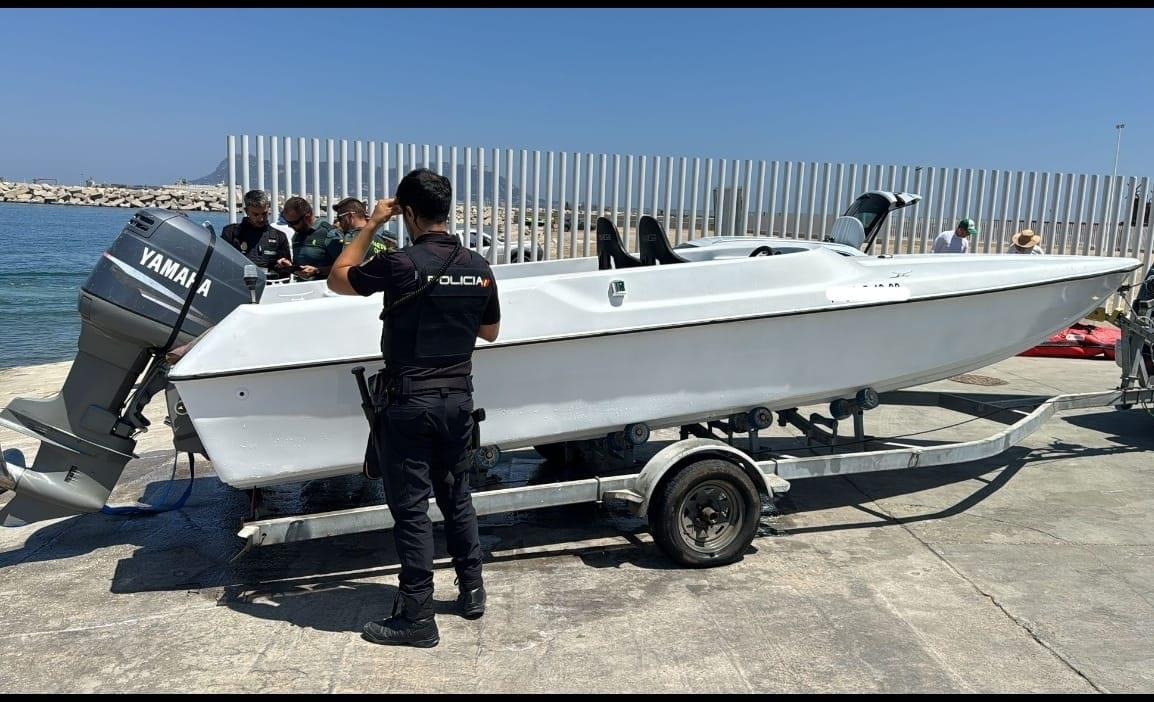Drug traffickers change tack in Strait of Gibraltar and along Costa del Sol
Along the coastline of the south of Spain, drug-running gangs are now bringing their illegal stashes ashore using a different technique to the previously familiar high-powered 'narco' boats
Juan Cano
Malaga
Monday, 19 August 2024, 12:15
They had become one of the regular sights of the summer for bathers enjoying a day at the beach on the Andalusian coast, mainly in Cadiz and Malaga provinces – a powerful drug boat being chased by a Guardia Civil patrol boat, or drug dealers unloading dozens of bales on the shore with total impunity. However, this year there have hardly been any such scenes, nor have videos of chases gone viral. Something has changed in the continual battle against the narcotics trade in the south of Spain.
Last February's deaths in Barbate, when a boat literally ran into a craft carrying six Guardia Civil officers and killed two of them, have changed the ecosystem of the Strait of Gibraltar. Although there were those who said that the underworld uncorked bottles of champagne after the crimes, the real drug lords lived through the episode with anger and concern for their business. As a result, SUR has tried to take a snapshot of the current situation and the result is clear: the drug trade in the south of Spain is diversifying.
Officers specialised in the fight against narcotics, who have worked for decades in the Campo de Gibraltar and the Costa del Sol hotspot areas, confirm that there has been a "decrease" in seizures by all security forces, i.e. National Police, Guardia Civil, customs surveillance and Local Police. The reason, they say, is that the drug traffickers have "diversified" the way they introduce drugs and, instead of attempting large shipments, they are making small consignments in order to risk less merchandise.
Diversification
"Algeciras is at a standstill because they are exploring new entry routes, and in the Guadalquivir area, after the latest operations, we have also observed a significant slowdown in activity," said a commander of the special response group against organised crime (Greco), who blamed this situation on the "resentment" caused by the events in Barbate, which have raised the tension in the war they waged against drug trafficking in the area. "Now they are being more cautious," he added.
The clearest example to illustrate this change in trend occurred on 4 August. The security forces were informed that a recreational boat set sail from Ceuta towards the Campo de Gibraltar. The crossing lasted 15 minutes. The 'target', which looked more like a small boat dedicated to sport fishing than a narco-boat, crossed the Strait of Gibraltar with ten bales of drugs and unloaded them at two different points on the Andalusian coast. The police managed to intercept it, but found no trace of the goods or the crew.
Emerging business
The most striking change is that the traditional narco-boats now function as 'mother ships'. According to anti-drug officers, the high-powered boats load the entire stash - one, two or three thousand kilos - in North Africa and transport them to within a few miles off the Spanish coast. Jet skis and smaller, sports-type boats, usually used for fuel supply, known as 'petaqueras', then travel to this point, where the goods are distributed and later unloaded at different points along the coastline.
Eye-catching change
The change of the drug trade has had other consequences. To begin with, it has triggered an emerging business on the coasts of Cadiz and Malaga: the 'petaqueos'. While the Spanish government is working on a legal reform to make it a crime (currently it is only an administrative offence), police have detected that some gangs in the Campo de Gibraltar "no longer want to touch hashish and are dedicated solely to supplying fuel" to the narco-boats.
The main reason is that, after the Royal Decree that banned them in 2018, the rubber dinghies never leave the water: they wait on the high seas, side-by-side in floating ports in the middle of the Mediterranean, until they receive a call with the next order. Sometimes they don't even know what they are carrying - police intelligence has discovered that cocaine shipments are being made in the same bales used for hashish.
Intensified surveillance
While continuing to monitor the beaches, the police have intensified surveillance in ports, dry docks and sheltered areas where criminal activity is camouflaged among the recreational activity. They are also investigating the appearance of longer routes, away from the Campo de Gibraltar, just as happened when the radars of the integrated external surveillance system (SIVE) were gradually implemented, which moved the caches to unprecedented latitudes, such as the Levantine coast or even the coast of Gerona.
The dismantling of one of the most active organisations in Campo de Gibraltar was announced yesterday, with the arrest of a total of 33 people who used pleasure boats to transport hashish.
